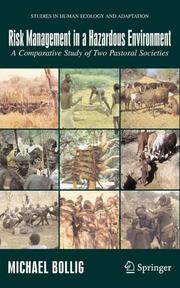| Listing 1 - 1 of 1 |
Sort by
|

ISBN: 9780387275826 0387275819 9780387275819 1441939024 9786612823718 0387275827 128282371X Year: 2006 Publisher: New York, NY : Springer US : Imprint: Springer,
Abstract | Keywords | Export | Availability | Bookmark
 Loading...
Loading...Choose an application
- Reference Manager
- EndNote
- RefWorks (Direct export to RefWorks)
A research focus on hazards, risk perception and risk minimizing strategies is relatively new in the social and environmental sciences. This volume by a prominent scholar of East African societies is a powerful example of this growing interest. Earlier theory and research tended to describe social and economic systems in some form of equilibrium. However recent thinking in human ecology, evolutionary biology, not to mention in economic and political theory has come to assign to "risk" a prominent role in predictive modeling of behavior. It turns out that risk minimalization is central to the understanding of individual strategies and numerous social institutions. It is not simply a peripheral and transient moment in a group’s history. Anthropologists interested in forager societies have emphasized risk management strategies as a major force shaping hunting and gathering routines and structuring institutions of food sharing and territorial behavior. This book builds on some of these developments but through the analysis of quite complex pastoral and farming peoples and in populations with substantial known histories. The method of analysis depends heavily on the controlled comparisons of different populations sharing some cultural characteristics but differing in exposure to certain risks or hazards. The central questions guiding this approach are: 1) How are hazards generated through environmental variation and degradation, through increasing internal stratification, violent conflicts and marginalization? 2) How do these hazards result in damages to single households or to individual actors and how do these costs vary within one society? 3) How are hazards perceived by the people affected? 4) How do actors of different wealth, social status, age and gender try to minimize risks by delimiting the effect of damages during an on-going crisis and what kind of institutionalized measures do they design to insure themselves against hazards, preventing their occurrence or limiting their effects? 5) How is risk minimization affected by cultural innovation and how can the importance of the quest for enhanced security as a driving force of cultural evolution be estimated?
Social Sciences. --- Anthropology. --- Community & Population Ecology. --- Social sciences. --- Ecology. --- Sciences sociales --- Ecologie --- Anthropologie --- Africa -- Environmental conditions. --- Environmental risk assessment -- Africa. --- Himba (African people) -- Social conditions. --- Human ecology -- Africa. --- Indigenous peoples -- Ecology -- Africa. --- Risk management -- Africa. --- Suk (African people) -- Social conditions. --- Human ecology --- Environmental risk assessment --- Risk management --- Indigenous peoples --- Suk (African people) --- Himba (African people) --- Anthropology --- Sociology & Social History --- Social Sciences --- Social Change --- Anthropogeography & Human Ecology --- Ecology --- Social conditions --- Social conditions. --- Africa --- Environmental conditions. --- Cimba (African people) --- Himba (Bantu people) --- Luzimba (African people) --- Ovahimba (African people) --- Ovazemba (African people) --- Ovazimba (African people) --- Shimba (African people) --- Simba (African people) --- Tjimba (African people) --- Vatwa (African people) --- Zemba (African people) --- Bawgott (African people) --- Hill Suk (African people) --- Pakot (African people) --- Plains Suk (African people) --- Pokot (African people) --- Suks --- Aboriginal peoples --- Aborigines --- Indigenous populations --- Native peoples --- Native races --- Community ecology, Biotic. --- Ethnology --- Nilotic peoples --- Insurance --- Management --- Bantu-speaking peoples --- Risk assessment --- Precautionary principle --- Eastern Hemisphere --- Human beings --- Biocenoses --- Biocoenoses --- Biogeoecology --- Biological communities --- Biomes --- Biotic community ecology --- Communities, Biotic --- Community ecology, Biotic --- Ecological communities --- Ecosystems --- Natural communities --- Population biology --- Behavioral sciences --- Human sciences --- Sciences, Social --- Social science --- Social studies --- Civilization --- Adivasis --- Balance of nature --- Biology --- Bionomics --- Ecological processes --- Ecological science --- Ecological sciences --- Environment --- Environmental biology --- Oecology --- Environmental sciences --- Primitive societies --- Social sciences
| Listing 1 - 1 of 1 |
Sort by
|

 Search
Search Feedback
Feedback About
About Help
Help News
News